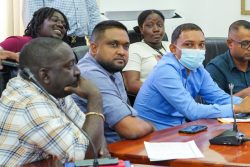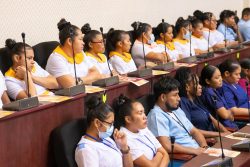A Guyanese man who was convicted of killing his infant son several years ago and abusing his then wife in Canada lost his bid earlier this month to remain in that country after his application for a judicial review of a deportation order was dismissed by Judge Paul S Crampton.
In his ruling, Judge Crampton found that the Director of the Case Determination, of the Case Management Branch of Citizenship and Immigration of that country, which was being challenged by Ramnaresh Katwaru, was reasonable and “transparent, intelligible and appropriately justified.” The judge also threw out the application by Katwaru to have this matter be placed under seal in the court.
According to the judgment, in May 1992 Katwaru was granted permanent residency in Canada but in 1996 he was charged with manslaughter in connection with his infant son’s death. In 2002 he was convicted on that charge and sentenced to six years imprisonment, with credit for 17 months of pre-trial custody. In April 2003, he was also convicted of assaulting his then wife and was sentenced to three months imprisonment to be served concurrently with his manslaughter sentence.

After he was found to be inadmissible to Canada, he submitted an application for permanent residence on humanitarian and compassionate grounds. However, in February of this year his application was rejected and he then applied to Judge Crampton’s court to have the director’s decision set aside.
The background of the case stated that in 1995 Katwaru and his former wife had a son who was born prematurely and after a four-month stay in the hospital the child was discharged.
“Following the receipt of information from his former wife that he was handling the child ‘in a rough manner’, an investigation was commenced with the Children’s Aid Society. A High Risk Infant Care Nurse was then assigned to the family. However, the intervention of professionals who regularly visited the home was not sufficient to stop Mr Katwaru’s systematic abuse of his son,” the judgment said.
Subsequently the child died at the age of five months and it was later determined that the cause of death was very severe swelling of the brain, likely caused by being severely shaken back and forth or his head and neck being rotated. There were also bruises to the baby’s brain that were consistent with him having been “swung against something or hit with something.” In addition, there were injuries that were consistent with repeated abuse.
Katwaru was initially convicted of manslaughter in 1998 and also of uttering threats and assault upon his former wife. Those convictions were set aside as a result of erroneous jury instructions and he was again convicted in 2002 and 2003.
In April 2003, he was found inadmissible on the grounds of criminality and while a removal order was issued against him it was stayed pending the completion of his sentence. In January 2005, he applied for humanitarian compassion but was found ineligible and in 2006 an application for judicial review was dismissed. Early 2007 he was arrested and detained for removal to Guyana which was scheduled for February 10, 2007 and while an officer with the Canadian Border Services Agency (CBSA) refused to defer his removal a stay was granted by the court.
He applied again for a review and this was thrown out in February of this year and then Judge Crampton dismissed his last ditch effort on December 10.
In his application Katwaru had argued that should he be returned to Guyana his ex-wife’s parents/family who are in Guyana will target him for ill-treatment to avenge the death of their grandchild. He also said that the Guyanese public would target him for ill-treatment “based on the negative coverage” of his crime. He said the Guyana government would also target him because of his criminal deportee status and that he would face various generalised risk due to the high rate of crime in Guyana and his particular vulnerability as a returning citizen from abroad. According to him there is also insufficient state protection and there would also be risk due to the tensions between the two main races in Guyana.
Little weight was placed on the various anonymous comments that had been posted on the Internet as there was no evidence that the comments were posted by persons in Guyana. The director found that there was no evidence that the Guyanese public would be in any way galvanized into actively tracking his case and following through with any vigilante acts of street justice. In support of his argument Katwaru provided copies of news articles published in newspapers that were circulated in Guyana. The articles were published over the period October 5, 2008 and October 9, 2008, following his convictions, but it was pointed out that the articles simply reported the facts with respect to his convictions.








